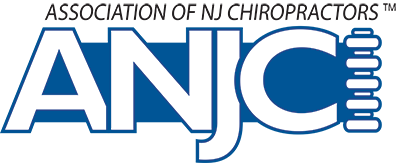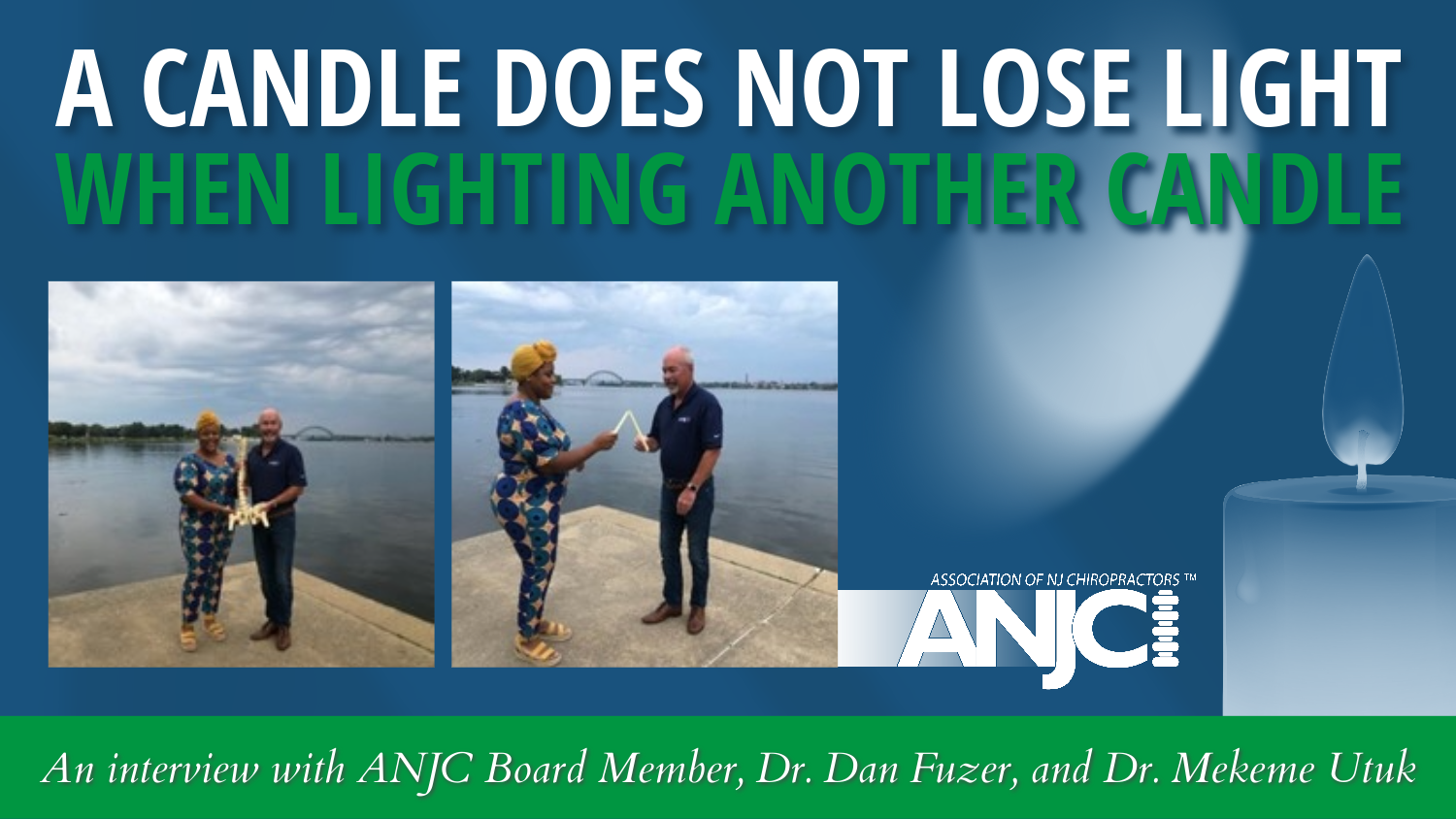In an industry where connections can shape careers, the bond between ANJC Board Member Dr. Dan Fuzer and Dr. Mekeme Utuk stands as a shining example. Their story, rooted in serendipity and a shared dedication to chiropractic practice, highlights the significance of mentorship. Join us as these chiropractors from different career stages reveal their journey, challenges, and the transformative power of guiding another’s path.
How did you meet each other and establish a “mentor” relationship? How often do you connect, and what sort of questions do you discuss?
Dr. Utuk: I am very passionate about addressing the stress component of the triad of health, i.e., trauma, toxins, and thoughts. That passion led me to earn my NeuroEmotional Technique (NET) certification in early 2023. I am currently an associate at a high-volume practice in Philadelphia and have been unable to practice NET. It may sound funny, but I was meditating one Thursday morning and felt the impulse to send an email to the owner of Apple Chiropractic to see if there was interest in renting out a room for me to do NET. I have family in Palmyra, NJ, and drove by Apple Chiropractic at least once per week for years.
Dr. Fuzer: In late April, I received an email from Dr. Utuk asking if I was interested in renting office space for her to practice NET. I was not in a position to rent out space, but I responded to her email and encouraged her to stop in and introduce herself. As it turned out, we had a lot in common. We are both Rutgers graduates and considered careers as medical doctors before our perspective on healthcare shifted. We have a passion for NET and follow Dr. Gerry Creedon, a fellow chiropractor who was a big influence on me becoming a chiropractor. Dr. Creedon has also been a longtime friend and was the best man at my wedding.
Dr. Utuk: Since that first day we met in person, Dr. Fuzer and I have stayed in touch through frequent phone calls and texts. We discuss all sorts of topics ranging from branding, marketing strategies, EHR, and accounting. Being the youngest in my family, I am very accustomed to seeking out the wisdom of those who are more seasoned than me. It has been fun to hear how Dr. Fuzer takes from his wealth of experience and advises me as though he were to start his career all over again.
How long have you been a member of the ANJC? How have the relationships you’ve built within the organization helped you personally and professionally?
Dr. Fuzer: I have been a member of the ANJC from day one, having been one of the DCs who laid the groundwork for the ANJC with the forum and the unity talks. I have served on the ANJC Board of Directors for 16 years. My colleagues on the ANJC Board are the best of the best. They are committed to making the profession stronger and better. The friendships forged on the board will last a lifetime. I am honored and privileged to work with these brilliant chiropractors and grateful to have had the opportunity to serve with them. My tenure as a board member will end this Fall but I will continue as an ANJC member.
Dr. Utuk: I am a new ANJC member, having joined in June 2023. When I first met Dr. Fuzer, he mentioned he was an ANJC Board member, but it didn’t register until I randomly visited the ANJC website and saw his name and photo. I knew I had to join then and there! I’m licensed in New Jersey but have only practiced in Philadelphia, so I haven’t had the opportunity to develop many contacts in our state. With the vision of establishing my practice in NJ, I wanted to have the support of the ANJC in the process. I am still in the early phase of establishing my business, but meeting Dr. Fuzer has been integral.
Dr. Fuzer connected me with ANJC Legal Counsel Jeff Randolph, who found time to meet with me and answer all my legal questions. He also provided me with a checklist of things to do that I did not know I needed as I progressed along the next steps. My biggest realization in this process has been identifying blindspots—I don’t know what I don’t know. Having the support of those with so much experience has really put me at ease and allows me to focus on growth without the constant worry that I am making mistakes.
Being a small business owner can be challenging. What are some of the unexpected challenges you’ve faced, and how did you handle them?
Dr. Fuzer: This is a difficult question to answer, as unexpected challenges happen a lot. My most critical and unexpected challenge came in March of 2020. Trying to navigate the lockdowns, mandates, curfews, masks, gloves, eye shields, hand sanitizer, Plexiglass. The fear that gripped the patients was palpable, and yes, I lost some to the disease.
Then there was the next set of challenges, filling out the PPP forms, weathering the financial storm, suffering through Zoom meetings, social distancing, contract tracing and quarantining. And social distancing. I also experienced floods from broken pipes, power outages, sewer backups, small kitchen fires from tents above the office, and Super Storm Sandy. These day-to-day challenges occur and you have to be flexible and stay focused. Obstacles are the things you see when you take your eyes off your goals.
As you built your practice, how did you define your brand and target market, and what have been the most effective marketing strategies you’ve used?
Dr. Utuk: I am still in the early stages of this and am focused on defining my business name, niche, and how to operate. In 2022, I registered my business as my full name. After further thought, I re-registered my business name as Downstream Solutions, with the goal of helping patients find more flow and ease in their lives. Through my work as an associate, I have identified my passion for helping and treating pregnant women. The idea that adjusting a pregnant woman can also positively impact an unborn child is so very beautiful to me. I also have a passion for addressing stress–we all have it, but most of us do not do anything about it until it manifests into something medically diagnosable. Ideally, I would like to have a mobile RV practice, but I’m currently debating between practicing as a mobile chiropractor versus opening a small office.
What led you to become a chiropractor?
Dr. Fuzer: In the Fall of 1978, I was studying biology at Rutgers and a member of the soccer team. I was mastering corner kicks, which we called “banana kicks” because the player kicked the ball with a lot of torque, causing it to hook into the goal. One day, while doing a corner kick, I was distracted and missed the ball, causing tremendous torsion in my lower back and pelvis. I fell to the ground and could not walk. The pain took my breath away. The next day, my dad took me to a local physical therapist. He did spinal manipulation and used some electrical muscle stim, gentle traction, rolled me on my side and thrust. I heard this loud pop and he said OK, that will do it, and he was right. I was up, walking around and pain-free. Two days later, I played against Penn State at Jeffery Field in State College.
I knew immediately I had to learn how to heal people like I had experienced. About a year later, I was living in a fraternity house and was introduced to an alumni brother, the future Dr. Gerry Creedon, who shared he was in chiropractic school. He explained healthcare as opposed to disease care and how function and structure are related. He further explained a vitalistic, holistic natural approach to healthcare. What he told me made complete sense. I knew I wanted to become a chiropractor at that very moment.
Dr. Utuk: I have wanted to be a doctor since I was a small child. I am the youngest of 4, my mother is a nurse anesthetist, and both of my sisters have Sickle Cell Anemia, so I grew up surrounded by medicine. My sisters’ hematologists at the Children’s Hospital of Philadelphia served as huge inspirations for me to want to become a medical doctor.
I earned my Bachelor’s Degree in Biology from Rutgers University, New Brunswick, and then enrolled in Harvard Medical School. During my rotations, I saw how patients would come into the hospital with the same issues over and over again–COPD, hypertension, diabetes, cancer, etc.–and, despite treatment, many patients would quickly return with the same complaints or with new side effects from their prior treatment. It felt like a dog chasing its own tail! I innately knew that there had to be more to healthcare than what I was experiencing. So, I decided to walk away from Ivy League education but did not know what my next step was.
I always enjoyed working with my hands and decided to go to massage therapy school. There, I had a substitute teacher (now a fellow DC, Dr. Brian Mitchell) who encouraged me to meet Dr. Michael Gorman, a holistic chiropractor in Fairless Hills, PA. At the time, similar to many uninformed people in our society, I admittedly had negative opinions about chiropractors and thought they were “quacks.” I still recall driving to Dr. Gorman’s office in June 2013, thinking, “Why would a chiropractor talk about digestion?” In the first few minutes of his presentation, Dr. Gorman said, “The body can heal itself,” and, “The power that made the body can heal the body.”
I quickly realized two things: My Ivy League education never said anything about this, and I had found my calling. Following the presentation, I introduced myself to Dr. Gorman, who immediately hired me as a chiropractic assistant in his office. After three years with Dr. Gorman, I relocated to Marietta, GA, to attend chiropractic school at Life University. I graduated as the Class Valedictorian in March 2020 and have been working as an associate chiropractor in Philadelphia ever since.
What’s the best advice you could give to a chiropractor just out of school, and planning to practice in New Jersey?
Dr. Fuzer: The best advice I can give a new graduate is to keep your overhead low. Next, if it sounds too good to be true it is and follow your gut instincts. And, as Dr. Utuk has done, find yourself a mentor. I believe the ANJC can facilitate a mentor program to coach new graduates. The new graduates are the future of our profession, let’s make it a bright one.
Dr. Utuk: Find a mentor! ANJC is full of them! And, shameless plug: Go to YouTube and search “Stressed – A Documentary Film” to learn about NeuroEmotional Technique and how it could benefit you and your patients!

